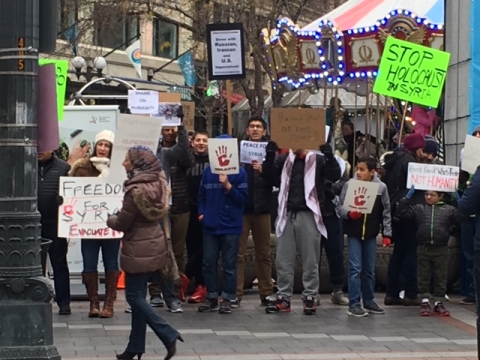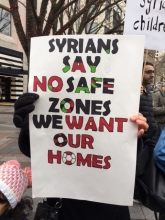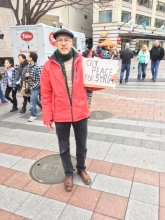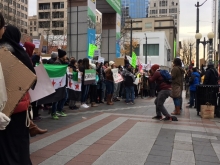
Thank you to Daniel Lefebvre, who shared this post.
"Shout it loud; shout it clear! Refugees are welcome here." The chants echoed amongst the holiday shoppers in Westlake Center, Seattle. "Assad, tell us, how many kids have you killed today?" "Putin, tell us, how many kids have you killed today?" As many times as the world says "never again," another genocide seems to unfold. Aleppo, Syria, may appear as distant to many of us in America, even as we bear witness to the heartbreak and horror through the lens of various media. But it seemed all too close for the Syrians, plus over 50 American supporters, who marched in the freezing cold last Sunday. They raised their voices to cry for peace in Aleppo and Syria: for their sisters, brothers, parents, grandparents, and friends. Theirs is a personal, intimate, and painful heartache.
We all understand the personal heartache when our own family members suffer. Yet, suffering is rarely as cruel and inhumane as indiscriminate war.
The protest organizers requested that people bring signs written in their own words. As I reflected on this request and collected pieces of poster board, I gradually inked "CryPeace for Syria," "Genocide is a product of deceit," "Be(come) the Heart of America," "Be the Grace that you wish to see," and "Blessed are the peacemakers." I pondered whether I might bear witness to anger expressed by a few others passing by, so it was important to me to call upon our values and hopes, and acknowledge our blessings.
In America, we used to say "our common values and hopes," yet that may not be asserted with the same degree of confidence in today's America. Authentic dialogue, negotiation, and peacemaking are viewed by some policymakers and citizens as weaknesses. Hence, the reference to deceit. Who truly is served by lies, manipulation of the media, and disregard for proven "facts?"
I decided to stroll with my sign, "CryPeace for Syria," to the four adjacent corners of the street to gain more attention from the public. The strategy was successful. An onlooker named Abraham engaged me in conversation, asking, "What motivated you to come out to protest? Why now? Why for Syria?"
"My heartache," I replied.
"Is there not another reason?" Abraham asked.
"Yes, my God calls upon me to bear witness to suffering and pain in the world and use my voice against oppression."
"Ah, I see. I have lived here in the United States for 13 years. It is a place of privilege for many."
"Yes, there are many more resources and wealth than in most countries, yet it is in the hands of the few. I was born and lived in the United States. I do not understand why there is so little compassion at times."
"You cannot say that! You see, I am a man of God also. We do understand it."
"You're right; maybe what I don't understand is what I'm to do about it. So I've decided to bear witness and be a peaceful presence, at least."
"Do you believe that the United States bears some culpability in this matter of genocide in Syria?"
"I believe that all parties share culpability, including the United States government."
"Do you not think that those who have more privilege and wealth bear more responsibility?"
"I believe that those whom God has blessed more, including myself, should be held more accountable and responsible. I guess that you could say that I felt that if I didn't say something here and now, it could be perceived by some that I tolerate man's inhumanity towards man. This would send the wrong signal that might allow it to become acceptable and to happen here in the United States. Indeed, it already is happening."
Abraham nodded."You see, we share a common belief." We exchanged a warm greeting at our departure.
I walked the periphery of the block for a few more circuits, then rejoined the main group of protesters and chanting. I acknowledged the Syrian children among us and expressed to a mother that I was happy that she was here in the United States. I was approached, eventually, by an elderly woman, one of the few other white protesters."What motivated you to come out to protest? she asked. I smiled, knowing that Abraham had prepared me better for this dialogue. Eventually, a young Syrian woman unfolded a thin, black prayer shawl and placed it on the sidewalk immediately to my left so that she and another Syrian woman and mother could pray. As they were doing, I stooped to arrange my protest signs under their prayer shawl to allow for a bit more comfort. I turned to allow them their privacy. They expressed gratitude to me after their prayer.
Subsequently, I overheard a conversation between two protesters. "This is class warfare in Syria. The powerful oppress the vulnerable. We are having the very same problems as you; indeed, we have the very same lifestyles. We are farmers, laborers, and carpenters. We get up early, we work all day to support our children and our families, we go to the grocers, and we try to find jobs when our work is taken away from us. Yet, we strive to gain our freedom. We seek a state based upon the very same principles of this country... the United States of America."
I chose to walk the 3.4 miles back to my home, with my CryPeace for Syria visible to the public. My day of witness gave me much to reflect upon.
- Log in to post comments




Comments
It is very informative site
Submitted by Eddie on Thu, 01/12/2017 - 08:24Very interesting website i have bookmarked crypeace.org for future reference.